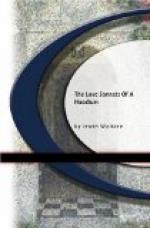Slang, the illegitimate sister of Poetry, makes with her a common cause against the utilitarian economy of Prose. They both stand for lavish luxuriance in trope and involution, for floriation and adornment of thought. It is their boast to make two words bloom where one grew before. Both garb themselves in Metaphor, and the only complaint of the captious can be that whereas Poetry follows the accepted style, Slang dresses her thought to suit herself in fantastic and bizarre caprices, that her whims are unstable and too often in bad taste.
But this odium given to Slang by superficial minds is undeserved. In other days, before the language was crystallized into the idiom and verbiage of the doctrinaire, prose, too, was untrammeled. Indeed, a cursory glance at the Elizabethan poets discloses a kinship with the rebellious fancies of our modern colloquial talk. Mr. Irwin’s sonnets may be taken as an indication of this revolt, and how nearly they approach the incisive phrases of the seventeenth century may easily be shown in a few exemplars. For instance, in Sonnet XX, “You’re the real tan bark!” we have a close parallel in Johnson’s Volpone, or The Fox:
“Fellows of outside and mere bark!”
And this instance is an equally good illustration also of that curious process which, in the English language, has in time created for a single word ("cleave,” for instance) two exactly opposite meanings. A line from John Webster’s Appius and Virginia might be cited as showing how near his diction approached modern slang:
“My most neat and cunning orator, whose tongue is quicksilver;”
and, for an analogy similar, though elaborate, compare lines 5-8 in Sonnet XI. In Beaumont and Fletcher’s Philaster,
“A pernicious petticoat prince”
is as close to “Mame’s dress-suit belle” of No. VII as modern costume allows, and
“No, you scarab!”
from Ben Jonson’s Alchemist gives a curious clue to the derivation of the popular term “scab” found in No. VI. Webster’s forcible picture in The White Devil —
“Fate is a spaniel; we cannot beat it from us!”
finds a rival in Mr. Irwin’s strong simile — “O Fate, thou art a lobster!” in No. IV. And, to conclude, since such similarities might be quoted without end, note this exclamation from Beaumont and Fletcher’s Woman’s Prize, written before the name of the insect had achieved the infamy now fastened upon it by the British Matron:
“These are bug’s words!”
Not only does this evidently point out the origin of “Jim-jam bugs” in No. IX, and the better known modern synonym for brain, “bug-house,” but it indicates the arbitrary tendency of all language to create gradations of caste in parts of speech. It is to this mysterious influence by which some words become “elegant” or “poetic,” and others “coarse” or “unrefined,” that we owe the contempt in which slang is held by the superficial Philistine.




